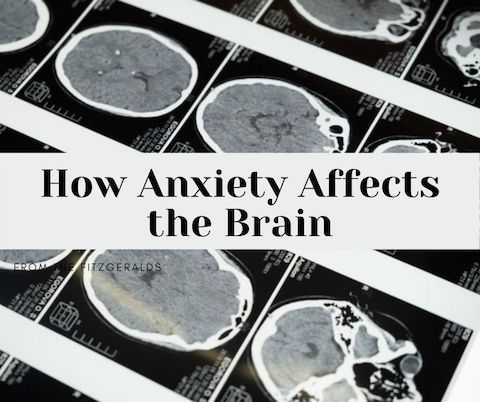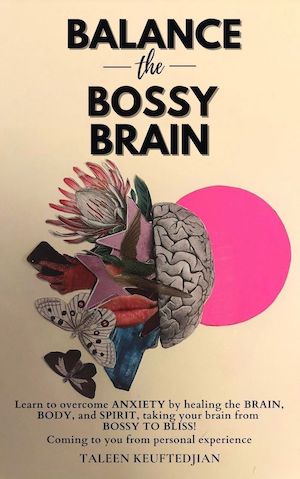Anxiety can be very frustrating and can cause all kinds of physical and emotional problems. I’ve suffered from anxiety for 18 years, so I can completely understand why you might be asking yourself, what are the anxiety effects on brain health? The physical symptoms, such as a racing heart, difficulty breathing, perspiration, loss of appetite, and irritability may be more obvious. But what does anxiety do to the brain?
Anxiety Effects on Brain Health
1) Memory problems
Anxiety affects memory because your brain is so busy focusing on useless fearful information that it neglects other important memories that are occurring in your life. Your brain starts to think that anxiety memories are the most important memories to store.
2) Causes inflammation which can lead to more anxiety
Stress hormones cause anxiety and anxiety causes more stress. Stress contributes to inflammation throughout the body. Inflammation interferes with the production and transportation of the happy chemicals to the brain, which can potentially lead to more anxiety.
3) Leads to depression
Anxiety is not a fun thing to experience on a regular basis or even at all for that matter. Someone who experiences anxiety often can also experience depression due to the impact and limitations anxiety can cause on someone’s daily life. The inability to live a normal life can affect how the person feels on a day-to-day basis. How anxiety affects the brain when it comes to depression relates to the fact that anxiety causes stress, and stress leads to inflammation. There’s a strong connection between inflammation and depression because inflammation makes it harder for the body to produce and transport the happy chemicals (serotonin and dopamine) to the brain’s receptors. A lack of these happy chemicals can contribute to depression. Check out my blog on how to reduce inflammation.

4) Can cause insomnia
Someone who experiences anxiety is so preoccupied with anxiety and fearful thoughts, that it keeps the brain active thereby making it harder to fall asleep. Anxiety also causes an overabundance of stress hormones throughout the body, which also makes it harder to fall asleep and stay asleep.
5) Can impact your happy chemicals
Anxiety causes stress, and stress causes inflammation. Inflammation makes it harder for the body to produce and transport happy chemicals such as serotonin and dopamine to the brain’s receptors.
6) Creates an overactive amygdala (fight or flight response)
The amygdala is the part of your brain responsible for assessing stressful situations and triggering the “fight or flight” response. So how does anxiety affect the brain when it comes to fearful thoughts? Think of the amygdala as a guard dog who is ready to sound the alarm when it senses danger. Every time you experience anxiety, panic attacks, or fear, the amygdala stores this information to use in the future. So essentially, anxiety makes your brain hyperactive to the fight or flight response, which in turn makes it harder to rationalize anxiety and fearful situations in the future. This is what keeps the vicious cycle of anxiety going. Facing your fears would retrain your brain to stop viewing these situations as a threat and would help you overcome anxiety.

7) Creates an under-active hippocampus, which is the portion of the brain responsible for learning, memory, fear inhibition, and stress control.
People with anxiety most likely have an overactive amygdala, which could also lead to an under-active hippocampus. The hippocampus is the portion of the brain responsible for memory, fear inhibition, and stress control, so it essentially keeps the amygdala in check. Chronic anxiety and stress can eventually deteriorate the hippocampus, which means that the loss of this portion of the brain weakens your ability to control anxiety and stress. This can be reversed through physical exercise, mental exercise, diet, and meditation.
8) Causes problems with the person's ability to think, process information, learn, concentrate, and focus.
The brain becomes so preoccupied and addicted to anxiety and fear, that it no longer has an attention span to learn new things or focus on the present moment. This makes it harder to take in and process new information.

9) Makes you more prone to stress
People with anxiety most likely have an overactive amygdala, which could result in an under-active hippocampus. The hippocampus is the portion of the brain responsible for stress control, so it essentially keeps the “stressful” amygdala in check. Chronic stress can eventually deteriorate the hippocampus, which means that the loss of this portion of the brain weakens your ability to control stress in the future. Don’t freak out! This can be reversed through physical exercise, mental exercise, diet, and meditation.
Overcoming anxiety starts with understanding how anxiety affects the brain. Chronic anxiety can affect the way your brain processes, stores, and handles information in the future, which is why reprogramming your brain is such an important step. Check out my book Balance the Bossy Brain to learn more about my personal experience with anxiety, anxiety effects on brain health, and how to overcome it.
A relatable guide to overcoming anxiety by finding the root cause, and bringing the brain, body, and spirit back into balance. Coming to you from personal experience!
Learn more about Habitat for Wellness


